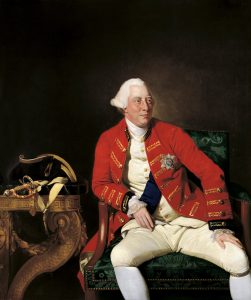Mozart, Beethoven, and Tchaikovsky
Wolfgang Amadeus Mozart, Ludwig van Beethoven, and Pyotr Ilyich Tchaikovsky are three of Western music’s most iconic and influential composers. Here’s a comparative overview of their lives, works, and legacies:
Wolfgang Amadeus Mozart (1756-1791)
Early Life:
- Born in Salzburg, Austria, in 1756.
- A child prodigy who began composing music at a very young age.
- He toured Europe extensively with his family, performing before royalty and nobility.
Major Works:
- Operas: “The Marriage of Figaro,” “Don Giovanni,” “The Magic Flute.”
- Symphonies: No. 40 in G minor, No. 41 in C major (“Jupiter”).
- Concertos: Piano Concerto No. 21, Violin Concerto No. 5.
- Chamber Music: “Eine kleine Nachtmusik,” String Quartets.
- Sacred Music: “Requiem Mass in D minor,” “Mass in C minor.”
Style and Influence:
- He is known for his clarity, balance, and form.
- He mastered and innovated in all musical genres of his time.
- His music is celebrated for its melodic beauty and technical precision.
Legacy:
- Mozart’s music remains a cornerstone of classical repertoire.
- His influence extends to countless composers, including Beethoven and Schubert.
- Widely regarded as a genius whose works continue to captivate audiences.
Ludwig van Beethoven (1770-1827)
Early Life:
- Born in Bonn, Germany, in 1770.
- Displayed musical talent from a young age and studied under several prominent musicians, including Haydn.
- Moved to Vienna in his early twenties to pursue a music career.
Major Works:
- Symphonies: No. 3 (“Eroica”), No. 5, No. 6 (“Pastoral”), No. 9 (“Choral”).
- Piano Sonatas: “Moonlight Sonata,” “Waldstein Sonata,” “Appassionata.”
- String Quartets: Op. 59 (Rasumovsky), Op. 131.
- Concertos: Piano Concerto No. 5 (“Emperor”), Violin Concerto.
- Other Works: “Fidelio” (opera), “Missa Solemnis.”
Style and Influence:
- Known for his emotional depth, structural innovations, and powerful expressions.
- Transitioned from the Classical style of Mozart and Haydn to the Romantic era.
- His music reflects his struggles, particularly his battle with deafness.
Legacy:
- Beethoven’s works are fundamental to the Western classical tradition.
- He influenced many later composers, such as Brahms and Wagner.
- His resilience and innovation make him a symbol of artistic perseverance and genius.
Pyotr Ilyich Tchaikovsky (1840-1893)
Early Life:
- Born in Votkinsk, Russia, in 1840.
- Began piano lessons at age five and showed early musical promise.
- Studied at the Saint Petersburg Conservatory under Anton Rubinstein.
Major Works:
- Ballets: “Swan Lake,” “The Sleeping Beauty,” “The Nutcracker.”
- Symphonies: No. 4, No. 5, No. 6 (“Pathétique”).
- Concertos: Piano Concerto No. 1, Violin Concerto.
- Operas: “Eugene Onegin,” “The Queen of Spades.”
- Other Works: “1812 Overture,” “Romeo and Juliet” (overture-fantasy).
Style and Influence:
- He is known for his expressive melodies, rich orchestration, and dramatic contrasts.
- His music often reflects deep emotional and psychological states.
- Blended Western European musical forms with Russian folk elements.
Legacy:
- Tchaikovsky’s works are among the most performed and beloved in the classical repertoire.
- He significantly influenced the development of Russian music.
- His ballets, symphonies, and concertos continue to enchant audiences worldwide.
Comparative Summary
Commonalities:
- All three composers significantly contributed to symphonic, operatic, and instrumental music.
- Their works remain staples of the classical music repertoire and continue to be performed globally.
- Each faced personal struggles that influenced their music and left a lasting impact on their legacy.
Differences:
- Mozart: Known for his prodigious talent and mastery of Classical form, with a focus on clarity and balance.
- Beethoven: Known for his emotional depth and innovation, bridging the Classical and Romantic eras.
- Tchaikovsky: Known for his expressive melodies and rich orchestration, blending Western and Russian musical traditions.
These composers’ unique styles and contributions have shaped the course of Western music, making them enduring figures in the history of classical music.
Mozart History
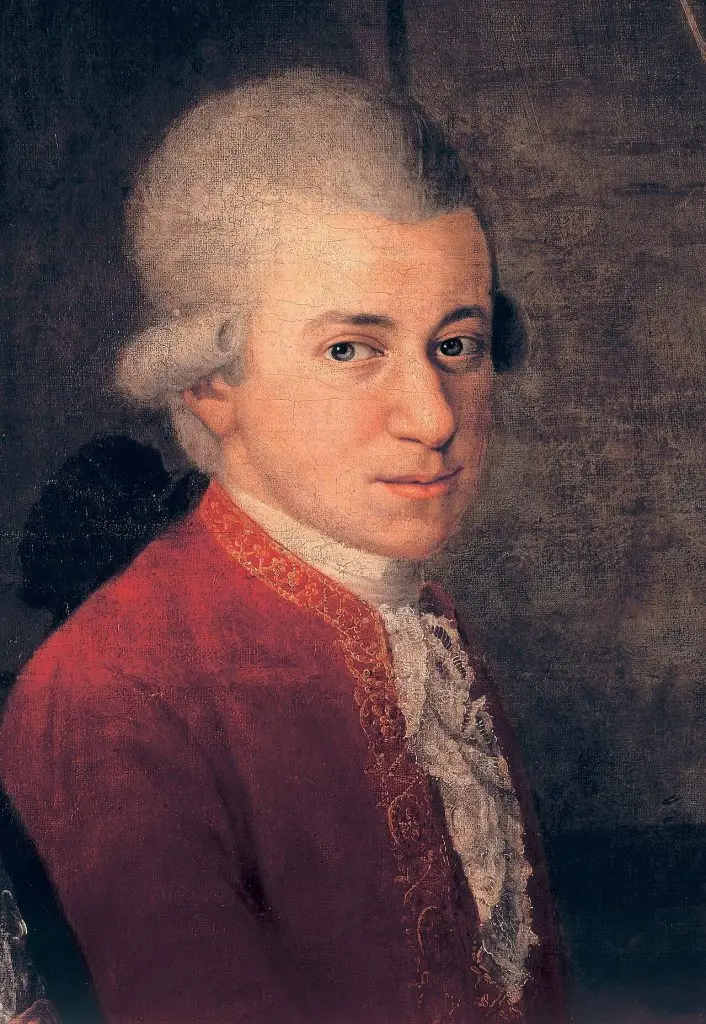
Wolfgang Amadeus Mozart (Wiki Image).
Here are ten notable quotes attributed to Wolfgang Amadeus Mozart, reflecting his wit, philosophy, and passion for music:
- On Music and Emotion:
- “Neither a lofty degree of intelligence nor imagination nor both together go to the making of genius. Love, love, love, that is the soul of genius.”
- On Simplicity:
- “It is a mistake to think that the practice of my art has become easy for me. I assure you, dear friend, nobody has devoted so much time and thought to composition as I. There is not a famous master whose music I have not industriously studied through many times.”
- On the Essence of Music:
- “The music is not in the notes, but in the silence between.”
- On His Work Ethic:
- “I pay no attention whatever to anybody’s praise or blame. I simply follow my own feelings.”
- On Musical Composition:
- “I cannot write in verse, for I am not a poet. I cannot arrange parts, for I am not a painter. I can neither by signs nor by pantomime express my thoughts and feelings, for I am not a dancer. But I can do it by sounds. I am a musician.”
- On Creativity:
- “When I am, as it were, completely myself, entirely alone, and of good cheer—say, traveling in a carriage, or walking after a good meal, or during the night when I cannot sleep—it is on such occasions that my ideas flow best and most abundantly.”
- On Public Opinion:
- “People make a great mistake who think that my art has come easily to me. Nobody has devoted so much time and thought to composition as I have. There is not a famous master whose music I have not industriously studied over and over.”
- On the Struggle of Creation:
- “To talk well and eloquently is a very great art, but an equally great one is to know the right moment to stop.”
- On Financial Hardships:
- “I write as a sow piddles.”
- On His Love for His Wife, Constanze:
- “I have never known a better, nobler, finer, more upright person than my dear wife. If people knew how much love I have for her, they would be embarrassed.”
These quotes provide a glimpse into Mozart’s personality, approach to music, and enduring passion for his art.
| Year | Age | Events, Travels & Compositions |
|---|---|---|
| 1756 | 0 | Born in Salzburg, Austria (January 27th) |
| 1761 | 5 | Begins composing. First documented compositions: Andante in C major and Allegro in C major for keyboard. |
| 1762 | 6 | First tour to Munich. Performs for Bavarian elector. |
| 1763-1766 | 7-10 | Grand tour of Europe with his family (Germany, France, England, Netherlands). Composed his first symphonies and performs for royalty. |
| 1767 | 11 | Travels to Vienna and Prague. Contracts smallpox. Composes his first opera, Apollo et Hyacinthus. |
| 1769-1771 | 13-15 | First journey to Italy. Composes operas Mitridate, re di Ponto, and Ascanio in Alba. Elected a member of the Accademia Filarmonica in Bologna. |
| 1772 | 16 | Becomes Konzertmeister to the Salzburg court. Composes Lucio Silla. |
| 1773 | 17 | Second journey to Italy. Composes La finta giardiniera. |
| 1775-1777 | 19-21 | Travels to Munich and Mannheim. Composes piano concertos and operas Il re pastore and Idomeneo. |
| 1778 | 22 | Journey to Paris with his mother (who dies there). Composes Paris Symphony. |
| 1779 | 23 | Returns to Salzburg as court organist. Composes Coronation Mass. |
| 1781 | 25 | Moves to Vienna. He breaks with his employer, the Archbishop of Salzburg. Composes Die Entführung aus dem Serail. |
| 1782 | 26 | Marries Constanze Weber. Composes Abduction from the Seraglio. |
| 1784 | 28 | Joins the Freemasons. Composes piano concertos. |
| 1786 | 30 | Premieres The Marriage of Figaro in Vienna. |
| 1787 | 31 | Appointed Imperial chamber composer to Emperor Joseph II. Composes Don Giovanni. His father, Leopold, dies. |
| 1788 | 32 | Composes his last three symphonies (Nos. 39, 40, and 41). Financial difficulties increase. |
| 1790 | 34 | Composes Così fan tutte. |
| 1791 | 35 | Composes The Magic Flute and the Requiem in D minor (unfinished). Dies in Vienna on December 5th. |
BBC Documentary 2015 – The Joy of Mozart
(YouTube video)
Wolfgang Amadeus Mozart is one of Western music’s most influential and celebrated composers. Here’s a comprehensive overview of his life and contributions:
Early Life
Birth and Family:
- Born on January 27, 1756, in Salzburg, Austria.
- Full name: Johannes Chrysostomus Wolfgangus Theophilus Mozart.
- Father: Leopold Mozart, a composer and violinist.
- Mother: Anna Maria Pertl.
Child Prodigy:
- Mozart displayed remarkable musical talent from a very young age.
- At three years old, he could play simple keyboard pieces; he was composing his music by five.
- His father, Leopold, recognized his son’s extraordinary talents and took him on extensive European tours. Young Wolfgang performed before the nobility during these tours and amazed audiences with his skill.
Career
Early Compositions and Travels:
- He composed his first symphony at the age of eight.
- During his travels, Mozart met and was influenced by many prominent musicians, including Johann Christian Bach in London.
- He composed in various genres, including symphonies, operas, chamber, and sacred music.
Salzburg Period:
- Worked as a court musician for the Prince-Archbishop of Salzburg from 1773 to 1781.
- During this time, he wrote many important works, including symphonies, piano concertos, and operas such as “Idomeneo.”
Vienna Years:
- 1781, Mozart moved to Vienna, where he married Constanze Weber in 1782.
- Vienna was a cultural hub, and Mozart became prominent in the city’s musical scene.
- Some of his most famous operas, including “The Marriage of Figaro” (1786), “Don Giovanni” (1787), and “Così fan tutte” (1790), were composed during his time in Vienna.
- He also composed many of his greatest symphonies and concertos during this period, including the last three symphonies (Nos. 39, 40, and 41) in 1788.
Major Works
Operas:
- “The Abduction from the Seraglio” (1782)
- “The Marriage of Figaro” (1786)
- “Don Giovanni” (1787)
- “Così fan tutte” (1790)
- “The Magic Flute” (1791)
Symphonies:
- “Symphony No. 25 in G minor” (1773)
- “Symphony No. 40 in G minor” (1788)
- “Symphony No. 41 in C major” (“Jupiter”) (1788)
Concertos:
- Piano Concertos, including No. 21 in C major (1785) and No. 23 in A major (1786)
- Violin Concertos, including No. 3 in G major (1775) and No. 5 in A major (“Turkish”) (1775)
Chamber Music:
- String Quartets, including “Haydn Quartets” (1782–1785)
- “Eine kleine Nachtmusik” (1787)
Sacred Music:
- “Requiem Mass in D minor” (1791, unfinished)
- “Mass in C minor” (1782–1783)
Personal Life
Marriage and Family:
- Married Constanze Weber on August 4, 1782.
- The couple had six children, but only two, Karl Thomas and Franz Xaver, survived infancy.
Financial Struggles:
- Despite his success, Mozart often faced financial difficulties. His lavish lifestyle and lack of financial management contributed to these problems.
Health and Death:
- Mozart’s health declined in the late 1780s. He continued to compose, even as his health worsened.
- He died on December 5, 1791, at the age of 35. The exact cause of his death remains uncertain, with theories ranging from rheumatic fever to poisoning.
Legacy
Influence:
- Mozart’s music is celebrated for its melodic beauty, formal elegance, and emotional depth.
- He influenced many following composers, including Ludwig van Beethoven and Franz Schubert.
Enduring Popularity:
- His works remain staples of the classical repertoire and are performed frequently worldwide.
- Mozart’s music has been featured in countless films, television shows, and other media, ensuring his continued relevance in contemporary culture.
Institutions and Honors:
- Numerous festivals, competitions, and institutions are dedicated to preserving and promoting Mozart’s legacy, including the annual Salzburg Festival and the Mozarteum University in Salzburg.
Mozart’s genius and prolific output have secured his place as one of the greatest composers in the history of Western music. His ability to convey deep emotion and complexity through music inspires and captivates audiences worldwide.
Mozart Detailed Life
Mozart’s Birth and Family: Child Prodigy
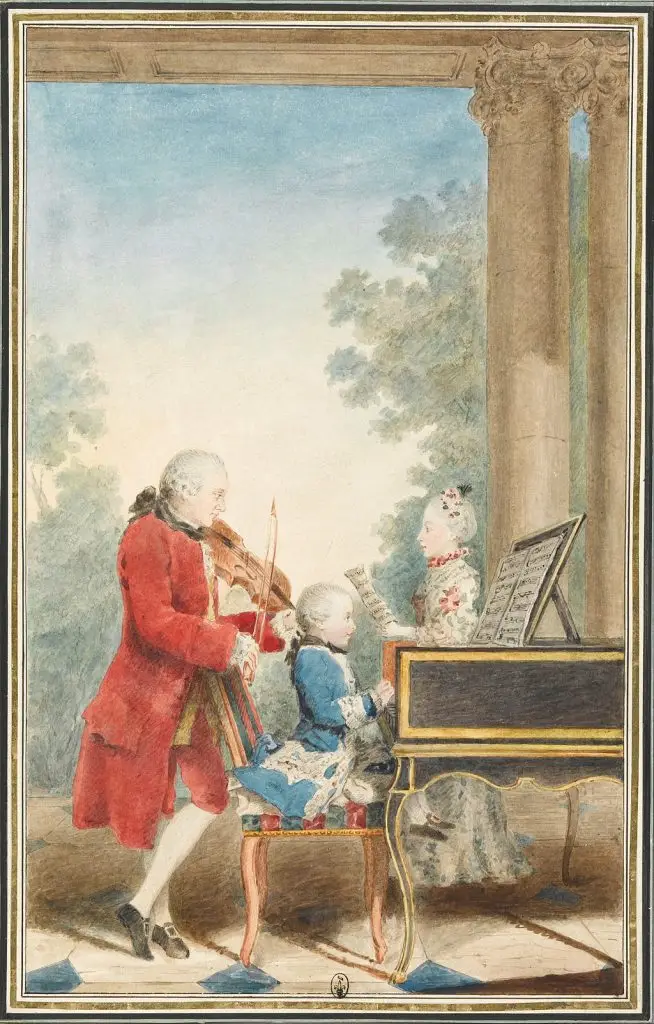 Mozart family on tour: Leopold, Wolfgang, Nannerl; watercolor by Carmontelle, c. 1763 (Wiki Image).
Mozart family on tour: Leopold, Wolfgang, Nannerl; watercolor by Carmontelle, c. 1763 (Wiki Image).
Wolfgang Amadeus Mozart, a name synonymous with musical genius, was born in Salzburg, Austria, on January 27, 1756. He was the youngest of seven children, though only he and his older sister Maria Anna (“Nannerl”) survived infancy. His father, Leopold Mozart, was a well-respected composer, violinist, and teacher. His mother, Anna Maria Pertl, came from a middle-class family with a background in music.
From a very young age, Mozart displayed extraordinary musical talent. He began playing the harpsichord at three and composing simple pieces by five. Recognizing his son’s prodigious abilities, Leopold dedicated himself to nurturing Mozart’s talent and showcasing it to the world.
At six, Mozart and Nannerl embarked on European tours, performing as child prodigies in the courts of royalty and aristocracy. The young Mozart amazed audiences with his virtuosic keyboard skills and improvisational abilities. These tours exposed him to various musical styles and traditions, further enriching his musical development.
Mozart’s early compositions, written during his childhood, demonstrate remarkable maturity and originality. He composed his first symphony at eight and his first opera at twelve. His innate musicality and his father’s rigorous training laid the foundation for his future success as a composer.
Constant travel, public performances, and intense study marked Mozart’s childhood. While this demanding lifestyle may seem unusual for a child, it was instrumental in shaping Mozart into the musical genius he became.
Mozart’s Early Compositions and Travels: Salzburg Period: Vienna Years
Mozart’s musical journey was marked by prolific composition and extensive travels, shaping his development as a composer and his legacy in the world of music.
Early Compositions and Travels:
Mozart’s early compositions, written during his childhood and teenage years, showcased his extraordinary talent and precociousness. Under the guidance of his father, Leopold, Mozart and his sister Nannerl embarked on several European tours, performing for royalty and aristocracy. These travels exposed Mozart to diverse musical styles and traditions, influencing his compositions and broadening his musical horizons.
Some of his notable early compositions include:
- Bastien und Bastienne (1768): A singspiel (opera with spoken dialogue) composed at the age of 12.
- Mitridate, re di Ponto (1770): An opera seria composed at the age of 14, showcasing his mastery of the Italian operatic style.
- Violin Concerto No. 3 (1775): A charming and virtuosic concerto written during his time in Salzburg.
Salzburg Period:
After returning from his travels, Mozart settled in Salzburg, where he served as court musician and concertmaster for the Archbishop of Salzburg. Although he composed numerous works during this period, including symphonies, concertos, and serenades, Mozart grew increasingly frustrated with the limitations of his position and the lack of artistic freedom.
Vienna Years:
In 1781, Mozart left Salzburg for Vienna, where he would spend the rest of his life. The Vienna years were marked by both artistic triumphs and financial struggles. Mozart composed some of his most celebrated works during this period, including:
- Die Entführung aus dem Serail (The Abduction from the Seraglio) (1782): A singspiel that blends European and Turkish musical elements.
- Piano Concerto No. 21 (1785): One of his most popular concertos, known for its lyrical beauty and elegance.
- Le nozze di Figaro (The Marriage of Figaro) (1786): A comic opera that challenged social conventions and explored themes of class and equality.
- Don Giovanni (1787): A dark and complex opera that delves into the themes of seduction, revenge, and morality.
- Così fan tutte (1790): A comic opera that explores the complexities of love and fidelity.
- Die Zauberflöte (The Magic Flute) (1791): A fantastical singspiel that blends elements of fairy tale, mythology, and social commentary.
- Requiem (1791): Mozart’s final and unfinished masterpiece, a mass for the dead.
Despite his artistic success, Mozart faced financial difficulties throughout his years in Vienna. He struggled to secure stable patronage and often found himself in debt. Nevertheless, his passion for music and his dedication to his craft never wavered, and he continued to compose at an astonishing pace until his untimely death in 1791 at the age of 35.
Mozart’s Marriage and Family: Financial Struggles: Health and Death
Mozart’s personal life was marked by both joy and sorrow, reflecting the complexities of his genius and the challenges he faced in his personal and professional life.
Marriage and Family:
In 1782, Mozart married Constanze Weber, a singer and the younger sister of his former love interest, Aloysia. Their marriage was passionate but also tumultuous, marred by financial difficulties and Mozart’s frequent travels. Despite these challenges, they had six children, though only two survived infancy.
Financial Struggles:
Mozart’s financial situation was often precarious. While he was a celebrated composer and performer, his income was not always consistent. He struggled to secure stable patronage and often found himself in debt due to his lavish lifestyle and fondness for gambling. This constant financial strain added stress to his already demanding life.
Health and Death:
Mozart’s health deteriorated in his final years. He suffered from various ailments, including rheumatic fever, kidney disease, and possibly syphilis. His hectic schedule, combined with his poor health, took a toll on his body and mind.
In November 1791, Mozart fell seriously ill while working on his Requiem, a mass for the dead. He died on December 5, 1791, at the age of 35. The cause of his death remains uncertain, with theories ranging from rheumatic fever to poisoning.
Mozart’s untimely death was a great loss to the world of music. He left behind a vast and diverse body of work that continues to inspire and enchant audiences worldwide. His genius, creativity, and passion for music continue to be celebrated and cherished as a testament to his enduring legacy.
Mozart’s Influence: Enduring Popularity: Institutions and Honors
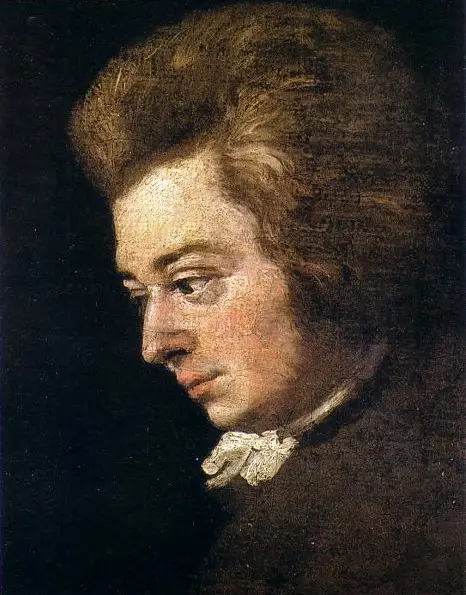
Detail of portrait of Mozart by his brother-in-law Joseph Lange (Wiki Image).
Influence:
- Musical Innovation: Mozart’s compositions are celebrated for their melodic beauty, formal perfection, and emotional depth. He was a master of various musical forms, including symphonies, operas, chamber music, and piano concertos.
- Form and Structure: His development of the sonata form and his contributions to the classical concerto set new standards in musical composition.
- Opera: Mozart revolutionized opera with works like “The Marriage of Figaro,” “Don Giovanni,” and “The Magic Flute,” which combined profound human insight with innovative musical storytelling.
- Teaching and Inspiration: Mozart influenced many composers, including Ludwig van Beethoven and Franz Schubert, who were inspired by his work’s technical brilliance and expressive power.
Enduring Popularity:
- Timeless Music: Mozart’s music remains incredibly popular and is regularly performed worldwide. His works are staples in the repertoires of orchestras, opera houses, and solo performers.
- Cultural Influence: His music is widely used in films, television, and advertising, introducing new generations to his genius. Pieces like “Eine kleine Nachtmusik” and the “Requiem” are instantly recognizable.
- Education: Mozart’s music is an essential part of music education, studied by students for its complexity and beauty. His works are often used as teaching material to demonstrate classical form and technique.
Institutions and Honors:
- Mozarteum: The International Mozarteum Foundation in Salzburg, Austria, is dedicated to preserving and promoting Mozart’s legacy. It supports research, performances, and education related to Mozart’s life and work.
- Salzburg Festival: This prestigious annual music festival in Mozart’s birthplace of Salzburg features numerous performances of his works, celebrating his contribution to music.
- Statues and Memorials: Mozart’s enduring impact on music and culture is honored by statues and memorials around the world, including notable ones in Salzburg, Vienna, and Prague.
- Mozart Museums: Several museums are dedicated to Mozart, including his birthplace in Salzburg and his residence in Vienna. These museums preserve artifacts, documents, and instruments related to his life.
- Awards and Competitions: Numerous awards and competitions are named in his honor, such as the Mozart Medal and the International Mozart Competition, which recognize excellence in classical music.
Mozart’s influence, enduring popularity, and the numerous institutions and honors dedicated to his memory all attest to his extraordinary legacy. His music continues to inspire and delight audiences around the world, making him one of the most celebrated composers in history.
Mozart Music
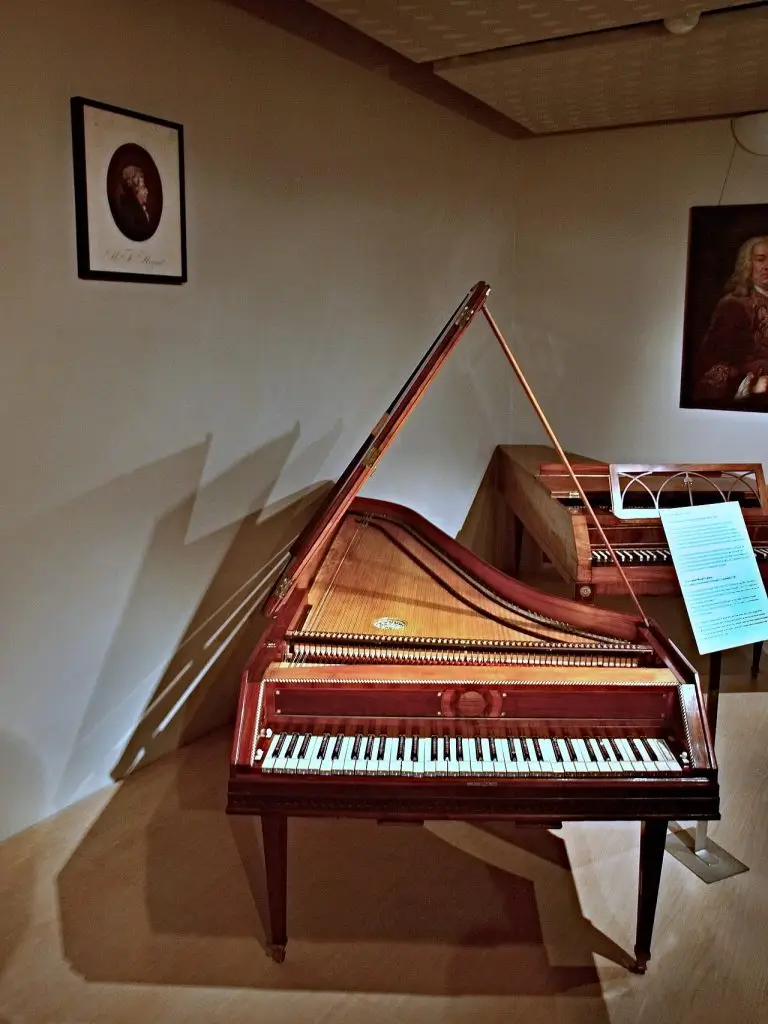
Mozart played Fortepiano in 1787, Czech Museum of Music, Prague (Wiki Image).
Operas
“The Abduction from the Seraglio” (1782)
Mozart: “Die Entführung aus dem Serail” Overture (with Score)
(YouTube video)
“The Marriage of Figaro” (1786)
The Marriage of Figaro – Overture (Mozart; Orchestra of The …
(YouTube video)
“Don Giovanni” (1787)
Don Giovanni – Overture (Orchestra of The Royal Opera …
(YouTube video)
“Così fan tutte” (1790)
Mozart Overture Cosi fan tutte – Sinfonia Rotterdam / Conrad …
(YouTube video)
“The Magic Flute” (1791)
Magic Flute overture- Mozart – Muti – Wiener philharmoniker
(YouTube video)
Symphonies
“Symphony No. 25 in G minor” (1773)
Mozart – Symphony No. 25 Movement 4 – Score
(YouTube video)
“Symphony No. 40 in G minor” (1788)
MOZART Symphony No 40 in G minor KV550 LEONARD …
(YouTube video)
“Symphony No. 41 in C major” (“Jupiter”) (1788)
(YouTube video)
Piano Concertos
No. 21 in C major (1785)
Wolfgang Amadeus Mozart – Piano Concerto No. 21 in C …
(YouTube video)
No. 23 in A major (1786)
Mozart – Piano Concerto No. 23 in A, K. 488 [complete]
(YouTube video)
Violin Concertos
No. 3 in G major (1775)
Mozart: Violin Concerto No. 3 – Hilary Hahn /Gustavo Dudamel …
(YouTube video)
No. 5 in A major (“Turkish”) (1775)
Mozart: Violin Concerto No. 5 in A Major, K. 219 “Turkish”: II …
(YouTube video)
Chamber Music
“Eine kleine Nachtmusik” (1787)
Mozart – Eine Kleine Nachtmusik
(YouTube video)
Sacred Music
“Requiem Mass in D minor” (1791, unfinished)
Mozart – Requiem in D minor, K. 626 [complete]
(YouTube video)
“Mass in C minor” (1782–1783)
Mozart’s Great Mass in C Minor- Kyrie
(YouTube video)
Beethoven History
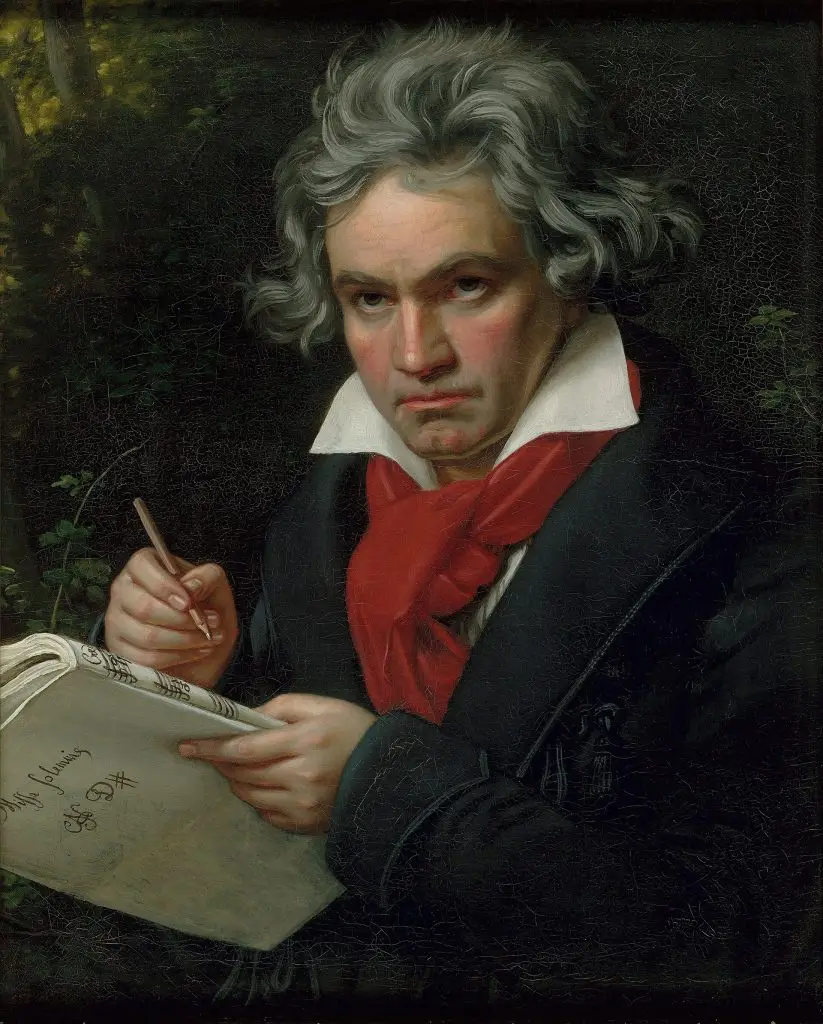
Beethoven with the Manuscript of the Missa Solemnis (1820) (Wiki Image).
Here are ten notable quotes attributed to Ludwig van Beethoven, reflecting his views on music, life, and his personal struggles:
- On Music and Emotion:
- “Music is the mediator between the spiritual and the sensual life.”
- On Adversity:
- “I will seize fate by the throat; it shall certainly never wholly overcome me.”
- On Personal Struggle:
- “I must live alone like one who has been banished.”
- On His Deafness:
- “For the past three years, my hearing has grown steadily weaker. I can give you some idea of this peculiar deafness by telling you that in the theater, I have to lean forward close to the orchestra in order to understand the actor and that from a distance; I do not hear the high notes of the instruments and the singers’ voices.”
- On Creativity:
- “I carry my thoughts about with me for a long time, often for a very long time, before writing them down.”
- On the Power of Music:
- “Music should strike fire from the heart of man and bring tears from the eyes of woman.”
- On His Passion for Music:
- “What I have in my heart and soul—must find a way out. That’s the reason for music.”
- On Perseverance:
- “Do not only practice your art but force your way into its secrets; art deserves that, for it and knowledge can raise man to the Divine.”
- On Artistic Integrity:
- “The true artist has no pride. He sees. Unfortunately, that art has no limits; he feels dark about how far he is from the goal, and though, perhaps, he may be admired by others, he grieves that he has not yet reached the point where the better genius shall shine before him like a distant sun.”
- On Hope and Resilience:
- “I will grapple with fate; it shall never drag me down.”
| Year | Age | Events, Travels & Compositions |
|---|---|---|
| 1770 | 0 | Born in Bonn, Germany (baptized December 17th) |
| 1778 | 8 | First public concert in Cologne. |
| 1779 | 9 | Begins studying with Christian Gottlob Neefe. |
| 1781 | 11 | Publishes first composition: Variations on a March by Dressler. |
| 1783 | 13 | Appointed assistant court organist. |
| 1787 | 17 | He travels to Vienna and possibly meets Mozart. |
| 1792 | 22 | Moves permanently to Vienna to study with Haydn. |
| 1795 | 25 | First public performance as a pianist in Vienna. Publishes first piano concertos and piano trios. |
| 1796 | 26 | Begins to lose his hearing. |
| 1800 | 30 | Premieres his First Symphony. |
| 1801 | 31 | Composes Moonlight Sonata. |
| 1802 | 32 | Writes the Heiligenstadt Testament, a letter expressing his despair over his deafness. |
| 1804 | 34 | Premieres his Third Symphony (Eroica), originally dedicated to Napoleon. |
| 1806 | 36 | Composes Violin Concerto. |
| 1808 | 38 | Premieres his Fifth and Sixth Symphonies (Pastoral) in the same concert. |
| 1812 | 42 | Meets Goethe in Teplitz. |
| 1814 | 44 | Achieved great fame with a performance of his Battle Symphony (Wellington’s Victory). |
| 1815 | 45 | Increasingly isolated due to deafness. He gains legal custody of his nephew, Karl. |
| 1818 | 48 | Begins work on his Ninth Symphony. |
| 1824 | 54 | Premieres his Ninth Symphony (with the Ode to Joy) in Vienna. |
| 1827 | 57 | Dies in Vienna on March 26th. |
BBC The Genius of Beethoven – The Rebel (Part 1/3)
BBC The Genius of Beethoven – Love and Loss (part 2/3)
BBC The Genius of Beethoven – Faith and Fury (Part 3/3)
(YouTube video)
Ludwig van Beethoven is one of the most renowned composers in Western music history. His works bridge the Classical and Romantic eras, and his life story is one of remarkable artistic achievement and personal struggle. Here’s an overview of his life and contributions:
Early Life
Birth and Family:
- Born on December 17, 1770, in Bonn, Germany.
- He was baptized on December 17, 1770, which suggests he was born on December 16.
- Father: Johann van Beethoven, a court musician and singer.
- Mother: Maria Magdalena Keverich.
Musical Training:
- Beethoven’s father recognized his musical talent early, pushing him to become a child prodigy like Mozart.
- He studied with several local musicians, including Christian Gottlob Neefe, who introduced him to the works of Bach and other composers.
Early Career
Move to Vienna:
- In 1787, Beethoven traveled to Vienna, where he briefly studied with Mozart. However, he had to return to Bonn due to his mother’s illness.
- After his mother’s death and his father’s decline, Beethoven returned to Vienna in 1792 to study with Joseph Haydn and later with other prominent musicians, such as Johann Georg Albrechtsberger and Antonio Salieri.
Early Works and Recognition:
- Beethoven quickly gained a reputation as a virtuoso pianist and an improviser.
- His early compositions, including the Piano Trios, Op. 1, and the first two symphonies, show the influence of Mozart and Haydn and his emerging personal style.
Middle Period (Heroic Period)
Hearing Loss:
- In the late 1790s, Beethoven began to experience hearing loss, which progressively worsened.
- Despite this, he continued to compose, perform, and conduct, although his increasing deafness made public performance more challenging.
Key Works:
- Symphonies: Symphony No. 3 (“Eroica”), Symphony No. 5, Symphony No. 6 (“Pastoral”), Symphony No. 7.
- Concertos: “Emperor” Concerto, “Violin” Concerto, “Triple” Concerto.
- Piano Sonatas: “Moonlight Sonata,” “Waldstein Sonata,” “Appassionata.”
- String Quartets: Op. 59 (Rasumovsky), Op. 74 (“Harp”).
- Opera: “Fidelio” (his only opera).
Characteristics:
- This period is marked by greater emotional depth, structural innovation, and expanded orchestration.
- His music often reflects his struggles and triumphs, particularly his battle with deafness.
Late Period
Profound Isolation:
- By the mid-1810s, Beethoven was almost completely deaf and retreated from public life.
- Despite his isolation, he composed some of his most complex and profound works during this period.
Major Works:
- Symphony No. 9 (“Choral”): Notable for its final movement, which includes a setting of Friedrich Schiller’s “Ode to Joy.”
- Late String Quartets: Op. 127, Op. 130, Op. 131, Op. 132, and Op. 135, considered some of the genre’s greatest and most innovative works.
- Missa Solemnis: A massive and profoundly spiritual mass setting.
- Piano Sonatas: Late sonatas like Op. 106 (“Hammerklavier”) and Op. 110.
Personal Life
Health and Relationships:
- Beethoven never married, though he had several significant relationships and unrequited loves.
- His personal life was marked by frequent illness, financial struggles, and conflicts, particularly over the custody of his nephew Karl.
Death:
- Beethoven died in Vienna on March 26, 1827, after a prolonged illness. Thousands attended his funeral, reflecting his status as one of Vienna’s most esteemed citizens.
Legacy
Musical Innovation:
- Beethoven’s work is characterized by its emotional depth, structural complexity, and innovation.
- He expanded the scope of the symphony, sonata, and quartet, paving the way for the Romantic era.
Influence:
- His influence on subsequent composers, including Brahms, Wagner, and Schubert, was profound.
- Beethoven’s music continues to be a cornerstone of the classical repertoire, widely performed and studied.
Cultural Impact:
- Beethoven is often seen as a symbol of artistic genius and personal resilience.
- His life and works have inspired countless adaptations and references in popular culture and continue to resonate with audiences worldwide.
Beethoven’s legacy as a composer of unparalleled genius, perseverance in adversity, and transformative impact on music history make him one of the most celebrated figures in Western art music.
Beethoven Detailed Life
Beethoven’s Birth and Family: Musical Training
Ludwig van Beethoven was born in Bonn, Germany, in 1770, although the exact date is uncertain. He was baptized on December 17th, and it is believed that he was born either the day before or a few days earlier.
Beethoven was born into a family of musicians. His grandfather, Kapellmeister Ludwig van Beethoven, was a prominent figure in the Bonn court, serving as the musical director. Beethoven’s father, Johann, was a singer in the court choir, but he was also an alcoholic and a harsh disciplinarian. His mother, Maria Magdalena Keverich, was a quiet and gentle woman who died when Beethoven was just 17 years old.
Beethoven’s musical talent became evident at a young age, and his father began teaching him music rigorously, hoping to mold him into a child prodigy like Mozart. However, Johann’s teaching methods were often harsh and abusive, and Beethoven’s childhood was marked by emotional and physical strain.
Despite these difficulties, Beethoven’s musical abilities continued to develop. He received additional instruction from other musicians in Bonn, including Christian Gottlob Neefe, the court organist, who introduced him to the works of Bach and Handel. Neefe also encouraged Beethoven’s early compositions, and by the age of 12, Beethoven had already published a few works.
Beethoven’s musical training in Bonn laid the foundation for his later achievements. His early exposure to the works of great composers, combined with his natural talent and determination, propelled him on a path to becoming one of the most influential and celebrated composers in history.
Beethoven’s Move to Vienna: Early Works and Recognition
Beethoven’s move to Vienna in 1792 was pivotal in his career.
He left his hometown of Bonn to study with Joseph Haydn, a renowned composer of the time. Vienna, the cultural capital of Europe, provided a rich artistic environment for Beethoven to flourish.
Early Works:
In Vienna, Beethoven quickly gained recognition as a virtuoso pianist and composer. His early works were characterized by their energy, passion, and innovative use of form and harmony. Some notable early compositions include:
-
Pathétique Sonata (Piano Sonata No. 8): This powerful and dramatic work showcases Beethoven’s emotional depth and technical skill.
-
Moonlight Sonata (Piano Sonata No. 14): One of Beethoven’s most famous and beloved works, known for its lyrical beauty and melancholic atmosphere.
-
Septet (Op. 20): A chamber work for seven instruments that became immensely popular and established Beethoven’s reputation as a composer.
Recognition:
Beethoven’s talent and innovative approach to music quickly earned him recognition and patronage from the Viennese aristocracy. He became a sought-after performer and teacher, giving concerts and private lessons to wealthy patrons. This support allowed him to focus on composing and experimenting with new musical ideas.
Napoleon:
Initially, Beethoven admired Napoleon Bonaparte, seeing him as a symbol of revolution and change. He even dedicated his Third Symphony, originally titled “Bonaparte,” to the French leader. However, when Napoleon declared himself Emperor in 1804, Beethoven became disillusioned and retitled the symphony “Eroica” (Heroic).
Beethoven’s move to Vienna began a prolific and influential career. He would go on to compose some of the greatest masterpieces of Western music, including his nine symphonies, piano concertos, string quartets, and the opera Fidelio. Despite his struggles with hearing loss, he continued to compose groundbreaking works that pushed the boundaries of music and cemented his place as one of the greatest composers of all time.
Beethoven Hearing Loss: Characteristics
Onset and Progression:
- Early Symptoms: Beethoven began noticing hearing loss symptoms in his late 20s. Initially, he experienced a ringing in his ears (tinnitus) and difficulty hearing high-pitched sounds.
- Progressive Deterioration: Over the next two decades, his hearing progressively worsened. By his mid-40s, Beethoven was almost completely deaf. This gradual loss deeply affected his ability to perform, conduct, and interact socially.
Characteristics:
- Tinnitus: One of Beethoven’s earliest and most persistent symptoms was tinnitus, a constant ringing or buzzing in the ears. This distressing condition interfered with his ability to hear music and conversation.
- Difficulty Hearing High Frequencies: As his hearing loss progressed, Beethoven had increasing difficulty hearing high-frequency sounds. This affected his ability to hear certain instruments and voices.
- Hearing Aids: Beethoven attempted to use various devices to aid his hearing. He used ear trumpets, which were early forms of hearing aids, but found them largely ineffective. He also tried a technique involving attaching a rod to his piano, which he would bite to feel the vibrations, allowing him to “hear” through the sensation of the vibrations.
- Social Isolation: As his hearing worsened, Beethoven became more socially isolated. He struggled to participate in conversations, leading to frustration and withdrawal from social interactions. He communicated through written notes and conversation books where others would write down their part of the conversation.
- Impact on Composition: Despite the hearing loss, Beethoven continued to compose music. He relied heavily on his inner hearing and musical imagination. Some of his most profound and innovative works, such as the late string quartets and the Ninth Symphony, were composed during his most significant hearing impairment.
- Emotional and Psychological Effects: Beethoven’s hearing loss profoundly impacted him emotionally. He felt isolated and despondent about his condition, as evidenced in his Heiligenstadt Testament, where he expressed his despair and suicidal thoughts but resolved to continue living for his art.
Adaptations and Coping Mechanisms:
- Inner Hearing: Beethoven’s ability to “hear” music in his mind was extraordinary. Even as his physical hearing declined, his internal auditory perception remained sharp, allowing him to compose complex and innovative music.
- Use of Conversation Books: To communicate with others, Beethoven used conversation books. Visitors and friends would write their questions or comments, and Beethoven would respond verbally or in writing.
- Conducting and Performing: Beethoven’s hearing loss impacted his ability to act and perform. During the premiere of his Ninth Symphony, he famously continued conducting even after the orchestra had finished, unaware of his deafness. An assistant had to turn him around to see the audience’s applause.
Impact on his Music:
Beethoven’s hearing loss had a profound impact on his music. While it caused him great personal anguish, it also forced him to explore new ways of composing and expressing himself. His later works, such as the late string quartets and the Ninth Symphony, are characterized by their innovative use of harmony, rhythm, and form, often pushing the boundaries of traditional musical structures.
Some musicologists believe that Beethoven’s hearing loss may have enhanced his creativity. As he became more reliant on his inner ear, he developed a deeper understanding of the expressive power of music. He was able to create works of extraordinary emotional depth and complexity.
Legacy and Inspiration:
- Symbol of Resilience: Beethoven’s ability to create profound and enduring music despite his hearing loss has made him a symbol of resilience and artistic triumph over adversity. His determination and innovation continue to inspire musicians and composers.
- Influence on Music: Beethoven’s late works, created during his period of profound deafness, are some of his most influential. They showcase his ability to push musical boundaries and explore new expressive possibilities, influencing generations of composers that followed.
Beethoven’s hearing loss was a defining aspect of his life and career, profoundly affecting his personal and professional experiences. Despite this significant challenge, he continued to compose some of the most enduring and innovative music in the classical repertoire.
Beethoven Profound Isolation
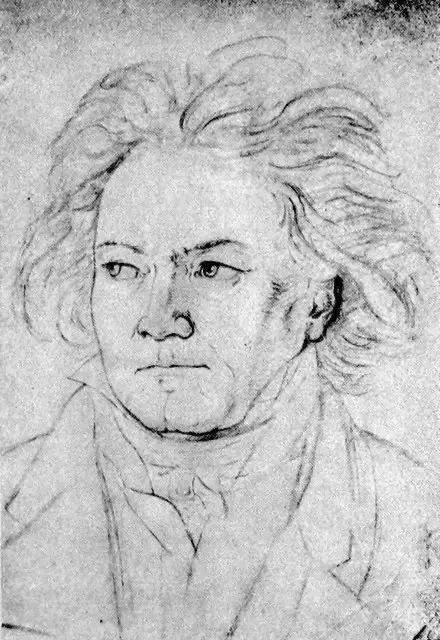 Beethoven in 1818 by August Klöber (Wiki Image).
Beethoven in 1818 by August Klöber (Wiki Image).
Hearing Loss and Isolation:
- Early Signs: Beethoven began to experience hearing problems in his late 20s. By his early 30s, his hearing loss became more pronounced, leading to significant difficulties in both his personal and professional life.
- Heiligenstadt Testament: In 1802, Beethoven wrote the Heiligenstadt Testament, a letter to his brothers in which he expressed his despair over his increasing deafness and contemplated suicide. Despite his anguish, he resolved to continue living for the sake of his art.
- Complete Deafness: By the middle of his life, Beethoven was almost completely deaf. He increasingly withdrew from society, finding it difficult to communicate with others. This profound isolation had a significant impact on his emotional and psychological well-being.
Creative Output Despite Isolation:
- Innovative Techniques: Beethoven’s isolation did not hinder his creative output. He continued to compose, relying on his inner hearing and imagination. His later works, including the Ninth Symphony and the late string quartets, are considered some of his most innovative and profound.
- Conversation Books: Beethoven used conversation books to communicate, where friends and visitors would write down their side of the conversation. These books provide insight into his thoughts and interactions during his later years.
- Emotional Depth: Beethoven’s isolation and struggles are reflected in his music’s emotional depth and complexity. His compositions from this period are marked by introspection, struggle, and triumph over adversity.
Personal Life and Relationships:
- Relationships: Beethoven’s hearing loss and isolation strained his relationships. He had few close friends and struggled with romantic relationships. His intense and often irascible personality further isolated him from others.
- Custody Battle: A significant episode in Beethoven’s later life was the custody battle over his nephew, Karl. Beethoven became deeply involved in Karl’s upbringing, but the relationship was fraught with difficulties and added to his stresses.
Legacy of Resilience:
- Symbol of Perseverance: Beethoven’s life story is one of remarkable resilience. Despite profound isolation and personal challenges, he continued to produce groundbreaking and influential music. His ability to overcome adversity has made him an enduring symbol of human perseverance and artistic integrity.
- Influence on Music: Beethoven’s later works, created during his period of profound isolation, have had a lasting impact on the music world. They are celebrated for their emotional intensity, structural innovation, and philosophical depth, influencing countless composers and musicians.
Beethoven’s profound isolation, caused by his hearing loss and personal struggles, profoundly impacted his life and work. Yet, his ability to transcend these challenges and create some of the most enduring and innovative music in history is a testament to his extraordinary talent and resilience.
Ludwig van Beethoven: Health, Relationships, and Death
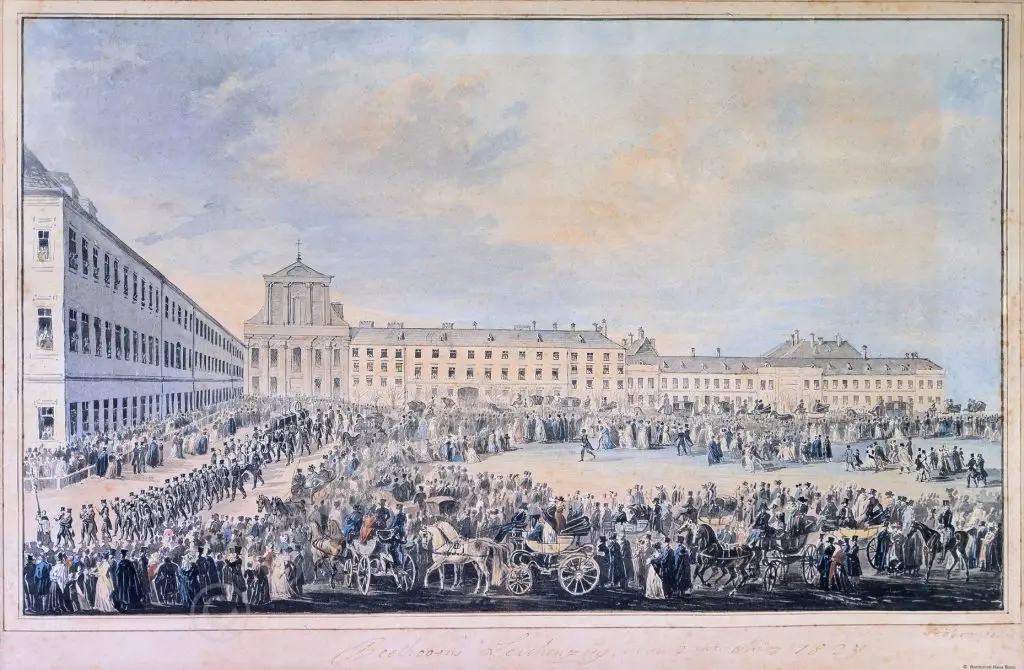 Beethoven’s funeral procession in 1827 (Wiki Image).
Beethoven’s funeral procession in 1827 (Wiki Image).
Health Issues:
- Hearing Loss: Beethoven’s most well-known health issue was his progressive hearing loss, which began in his late 20s and eventually led to total deafness by his mid-40s. This condition caused him immense emotional and psychological distress and significantly impacted his social interactions and career.
- Gastrointestinal Problems: Beethoven suffered from chronic gastrointestinal issues, including abdominal pain, diarrhea, and other digestive disturbances. These problems plagued him for much of his adult life.
- Liver Disease: In his later years, Beethoven exhibited symptoms consistent with liver disease, possibly exacerbated by heavy alcohol consumption. His autopsy revealed significant liver damage, which likely contributed to his death.
- Lead Poisoning: Recent analyses of Beethoven’s hair samples have indicated elevated levels of lead, suggesting that he may have suffered from lead poisoning. This condition could have contributed to his myriad health issues, including his gastrointestinal problems and possibly his mental health struggles.
Relationships:
- Family: Beethoven’s relationships with his family were complicated. He had a difficult relationship with his father, Johann van Beethoven, who was abusive and had issues with alcoholism. Beethoven took on a paternal role for his younger brothers after their father’s death.
- Nephew Karl: One of the most significant and tumultuous relationships in Beethoven’s life was with his nephew, Karl. After the death of his brother Caspar, Beethoven fought for and won custody of Karl. The relationship was strained, marked by Beethoven’s strict and demanding nature, which eventually led Karl to attempt suicide.
- Romantic Relationships: Beethoven’s romantic life was characterized by unrequited love and unattainable relationships. He never married, although he had several intense but ultimately unfulfilled romantic attachments, such as his “Immortal Beloved,” whose identity remains a subject of speculation.
- Friends and Patrons: Despite his difficult personality, Beethoven maintained friendships with several key figures in the music and aristocratic worlds. Patrons such as Archduke Rudolph, Prince Lichnowsky, and Countess Giulietta Guicciardi supported him financially and socially.
Death:
- Final Illness: Beethoven’s health deteriorated significantly in his final months. He suffered from jaundice, which indicated severe liver dysfunction. His condition worsened through the winter of 1826-1827, and he was bedridden for much of that time.
- Circumstances: Beethoven died on March 26, 1827, in Vienna. His last months were marked by significant pain and suffering. His friends and family were by his side, including Anselm Hüttenbrenner, who later reported that a dramatic thunderstorm marked Beethoven’s final moments.
- Autopsy: The autopsy conducted after his death revealed severe cirrhosis of the liver, significant damage to his pancreas, and other chronic health issues. These findings confirmed that Beethoven’s health problems were multifaceted and severe.
- Legacy: Beethoven’s death was widely mourned. His funeral, held on March 29, 1827, was attended by an estimated 20,000 people, reflecting his immense popularity and the impact of his music. He was buried in the Währing cemetery, and later, his remains were moved to the Zentralfriedhof in Vienna.
Profound health challenges and complex relationships marked Beethoven’s life. Despite these difficulties, he created some of the most influential music in history, and his legacy continues to inspire musicians and music lovers worldwide.
Beethoven Musical Innovation: Influence: Cultural Impact
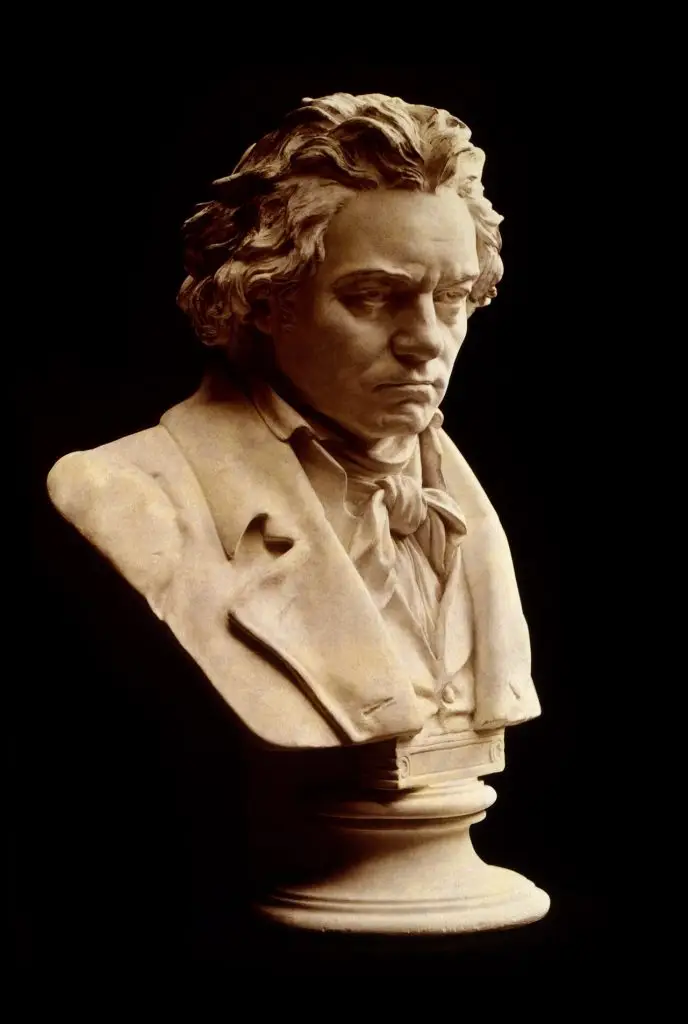
A bust of Beethoven, developed by Hugo Hagen in 1892 and now housed at the Library of Congress in Washington, D.C. (Wiki Image).
Musical Innovation:
- Symphonic Form: Beethoven expanded the scope and scale of the symphony, making it a more profound and expressive form. His nine symphonies, particularly the Third (“Eroica”), Fifth, and Ninth (“Choral”), set new standards for orchestral music.
- Sonata Form: He transformed the piano sonata, incorporating greater complexity and emotional depth. Works like the “Moonlight Sonata,” “Pathetique Sonata,” and “Appassionata Sonata” are prime examples.
- String Quartets: Beethoven’s string quartets pushed the boundaries of the genre, exploring new harmonic and structural ideas. The late quartets, especially, are revered for their innovation and introspective nature.
- Concertos: His piano concertos, particularly the Fourth and Fifth (“Emperor”), and his Violin Concerto, combined virtuosic solo writing with symphonic integration.
- Opera: His only opera, “Fidelio,” is notable for its dramatic intensity and complex characters, incorporating profound themes of freedom and justice.
Influence:
- Romanticism: Beethoven’s works are seen as a bridge between the Classical and Romantic eras in music. His emphasis on personal expression and emotional depth influenced Romantic composers like Brahms, Wagner, and Mahler.
- Composers: His impact on subsequent composers was profound. Schubert, Mendelssohn, Berlioz, and Liszt, among others, drew inspiration from his innovations and emotional intensity.
- Techniques: His use of motifs, development of themes, and structural innovations became foundational for future generations of composers. His ability to convey a narrative or emotional journey through music influenced the symphonic poems and program music of the 19th century.
Cultural Impact:
- Universal Appeal: Beethoven’s music transcends cultural and temporal boundaries. His works are performed and celebrated worldwide, symbolizing human creativity and resilience.
- Ninth Symphony: The Ninth Symphony, with its “Ode to Joy” finale, has become an anthem of unity and freedom. It is performed at significant events and celebrations, symbolizing hope and brotherhood.
- Personal Struggle: Beethoven’s life story, including his struggle with deafness, resonates deeply with many. His perseverance in the face of adversity has made him an enduring symbol of human determination and artistic integrity.
- Influence on Other Arts: His music has inspired countless works of literature, visual art, and film. The dramatic and emotional qualities of his compositions make them popular choices for movie soundtracks and other media.
- Legacy: Institutions such as the Beethoven-Haus in Bonn and numerous festivals and competitions celebrate his legacy. His music is a cornerstone of Western classical music education and performance.
Beethoven’s musical innovations, profound influence on other composers, and significant cultural impact make him one of the most important figures in the history of Western music. His works continue to inspire and move audiences around the world, embodying the power of human creativity and resilience.
Beethoven Music
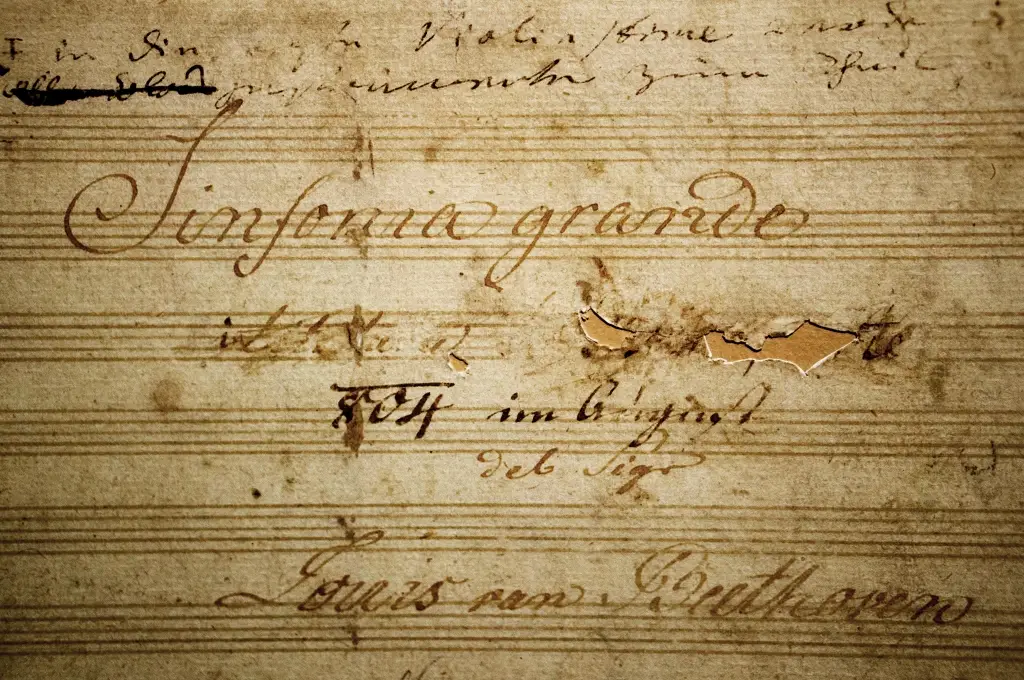
The title page of Ms. of the Eroica Symphony with Napoleon‘s name scored by Beethoven (Wiki Image).
Symphonies:
No. 3 (“Eroica”)
Beethoven: 3. Sinfonie (»Eroica«) ∙ hr-Sinfonieorchester …
(YouTube video)
No. 5
Beethoven – Symphony No. 5 (Proms 2012)
(YouTube video)
No. 6 (“Pastoral”)
Beethoven – Symphony No. 6 (Proms 2012)
(YouTube video)
No. 7
Beethoven – Symphony No. 7 – Iván Fischer …
(YouTube video)
No. 9 (“Choral”)
Beethoven – Symphony No. 9 “Choral” (Orquesta Reino de …
(YouTube video)
Concertos:
“Emperor” Concerto
Beethoven: Piano Concerto No. 5 “Emperor” Op. 73 – Daniele …
(YouTube video)
“Violin” Concerto
Itzhak Perlman – Beethoven: Violin Concerto (with Daniel …
(YouTube video)
Op. 56 (Triple Concerto)
Beethoven: Triple Concerto in C major, op. 56
(YouTube video)
Piano Sonatas:
“Moonlight Sonata”
Beethoven – Moonlight Sonata (Full)
(YouTube video)
“Waldstein Sonata”
Beethoven Sonata N° 21 ‘Waldstein’ Daniel Barenboim
(YouTube video)
“Appassionata”
Claudio Arrau Beethoven “Appassionata” (Full)
(YouTube video)
Op. 106 (“Hammerklavier”)
Beethoven Sonata N° 29 ‘Hammerklavier’ Daniel Barenboim
(YouTube video)
Op. 110
Ashkenazy: Beethoven – Sonata 31 Opus 110
(YouTube video)
String Quartets:
Op. 59 (Rasumovsky)
Castalian Quartet – Beethoven String Quartet in E minor, Op …
(YouTube video)
Op. 74 (“Harp”)
Beethoven String Quartet No 10 Op 74 Harp in E flat major …
(YouTube video)
Op. 127
Beethoven String Quartet No 12 Op 127 in E flat major Alban …
(YouTube video)
Op. 130
Beethoven String Quartet No 13 Op 130 in B flat major Alban …
(YouTube video)
Op. 131
Beethoven: String Quartet in C-sharp minor, Op. 131
(YouTube video)
Op. 132
Beethoven String Quartet Op. 132 in A Minor – Ariel Quartet (full)
(YouTube video)
Op. 135
Beethoven String Quartet Op. 135 in F Major – Ariel Quartet (full)
(YouTube video)
Missa Solemnis
Beethoven: Missa solemnis ∙ hr-Sinfonieorchester ∙ Wiener …
(YouTube video)
Opera:
“Fidelio”
(YouTube video)
Tchaikovsky History
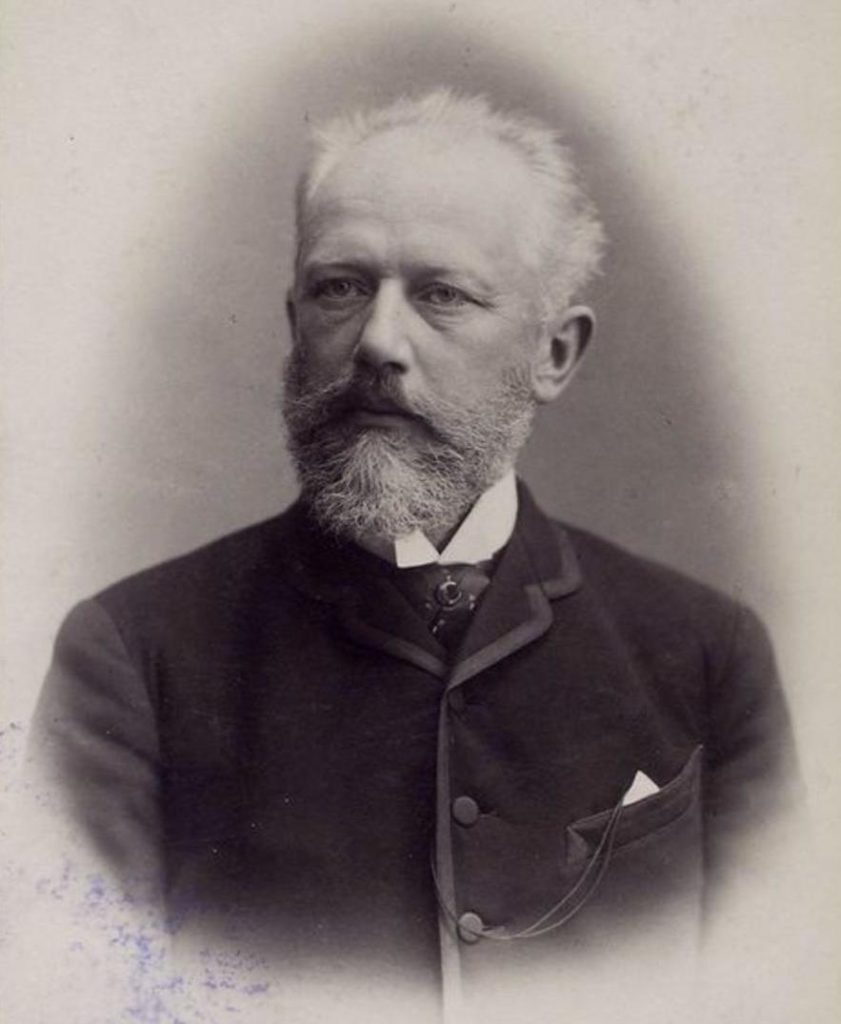
Tchaikovsky, c. 1888 (Wiki Image).
Here are ten notable quotes attributed to Pyotr Ilyich Tchaikovsky, reflecting his views on music, creativity, and his personal struggles:
- On Music and Emotion:
- “Music is the shorthand of emotion.”
- On Creativity:
- “Inspiration is a guest that does not willingly visit the lazy.”
- On the Role of the Composer:
- “A self-respecting artist must not fold his hands on the pretext that he is not in the mood.”
- On Passion for Music:
- “I sit down to the piano regularly at nine o’clock in the morning and work until one.”
- On the Nature of Art:
- “I consider that music is, by its very nature, essentially powerless to express anything at all.”
- On Artistic Integrity:
- “Truly, there would be reason to go mad were it not for music.”
- On Personal Struggles:
- “There is nothing more frightful than imagination without taste.”
- On the Creative Process:
- “To say that a composer is inspired when he composes is as if one would say that a pianist is inspired when he plays the piano.”
- On Artistic Effort:
- “In order to compose, all you need to do is remember a tune that nobody else has thought of.”
- On Love and Emotion:
- “I love tranquil solitude, where I can be alone with my thoughts.”
These quotes provide insight into Tchaikovsky’s thoughts on his craft, his disciplined approach to composition, and his philosophical reflections on life and art.
| Year | Age | Events, Travels & Compositions |
|---|---|---|
| 1840 | 0 | Born in Votkinsk, Russia (May 7th) |
| 1848 | 8 | Begins piano lessons. |
| 1850 | 10 | Enters Imperial School of Jurisprudence in St. Petersburg. |
| 1854 | 14 | His mother dies of cholera, a profoundly traumatic event. |
| 1859 | 19 | Graduates from the School of Jurisprudence and works as a clerk in the Ministry of Justice. |
| 1861 | 21 | Begins studying music theory with Nikolai Zaremba. |
| 1862 | 22 | Enters the newly opened St. Petersburg Conservatory. |
| 1865 | 25 | Graduates from the Conservatory with a silver medal. Composes his first symphony, Winter Daydreams. |
| 1866 | 26 | Appointed professor of harmony at the Moscow Conservatory. |
| 1868 | 28 | Meets and falls in love with Belgian soprano Désirée Artôt, but the relationship ends. |
| 1870 | 30 | Composes the fantasy overture, Romeo and Juliet. |
| 1874 | 34 | Composes his Piano Concerto No. 1. |
| 1875 | 35 | Composes his first ballet, Swan Lake. |
| 1876 | 36 | Begins a long and intense correspondence with his patroness, Nadezhda von Meck. |
| 1877 | 37 | A disastrous marriage to Antonina Miliukova leads to a mental breakdown. |
| 1878 | 38 | Resigns from the Moscow Conservatory and travels abroad, supported by von Meck. Composes his Violin Concerto. |
| 1880 | 40 | Composes the 1812 Overture. |
| 1881 | 41 | Completes the opera The Maid of Orleans. |
| 1885 | 45 | Composes the Manfred Symphony. |
| 1888 | 48 | Conducts his Fifth Symphony in St. Petersburg. |
| 1890 | 50 | Composes The Sleeping Beauty. |
| 1891 | 51 | Conducts in the United States. |
| 1892 | 52 | Composes The Nutcracker. |
| 1893 | 53 | Dies in St. Petersburg (November 6th), possibly from cholera. |
Tchaikovsky – 1. The Creation of Greatness (BBC)
Tchaikovsky – 2. Fortune and Tragedy (BBC)
(YouTube video)
Pyotr Ilyich Tchaikovsky is one of the most celebrated Russian composers, known for his emotive music and significant contributions to various musical genres, including ballet, symphony, opera, and chamber music. Here is an overview of his life and works:
Early Life
Birth and Family:
- Born on May 7, 1840, in Votkinsk, Russia.
- Father: Ilya Petrovich Tchaikovsky, a mining engineer.
- Mother: Alexandra Andreyevna, of French and Russian descent.
- Tchaikovsky was the second of six surviving children.
Musical Training:
- Began piano lessons at the age of five.
- Attended the Imperial School of Jurisprudence in Saint Petersburg, training for a career in civil service while continuing his musical studies.
Career Beginnings
Transition to Music:
- After briefly working as a civil servant, Tchaikovsky enrolled at the Saint Petersburg Conservatory in 1862 and studied under Anton Rubinstein.
- He graduated in 1865 and began his career as a music teacher and composer.
Early Works:
- His early compositions include the symphonic poem “Fatum” and his first symphony, “Winter Daydreams.”
- Moved to Moscow in 1866 to become a professor of harmony at the Moscow Conservatory, invited by Nikolai Rubinstein.
Major Compositions and Success
Ballets:
- “Swan Lake” (1876): One of his most famous ballets, commissioned by the Bolshoi Theatre.
- “The Sleeping Beauty” (1890): Another primary ballet premiered at the Mariinsky Theatre.
- “The Nutcracker” (1892): Perhaps his most iconic ballet, especially famous for its score and the “Dance of the Sugar Plum Fairy.”
Symphonies:
- Composed of six numbered symphonies, Symphony No. 4 (1877–78), Symphony No. 5 (1888), and Symphony No. 6 (“Pathétique,” 1893) are particularly renowned.
- His symphonies are known for their emotional intensity and innovative orchestration.
Concertos:
- Piano Concerto No. 1 in B-flat minor (1875): One of the most famous piano concertos, known for its powerful opening and lyrical melodies.
- Violin Concerto in D major (1878): A staple of the violin repertoire, notable for its technical demands and expressive depth.
Operas:
- “Eugene Onegin” (1879): Based on Alexander Pushkin’s novel, this opera remains a cornerstone of Russian opera.
- “The Queen of Spades” (1890): Another opera based on Pushkin, known for its dramatic intensity.
Overture:
- 1812
Personal Life
Struggles and Relationships:
- Tchaikovsky grappled with his homosexuality in a society that was intolerant of it.
- His brief, disastrous marriage to Antonina Miliukova in 1877 exacerbated his emotional turmoil.
- Had a significant, albeit platonic, relationship with his patroness, Nadezhda von Meck, who provided financial support and encouragement for many years.
Emotional Turmoil:
- Tchaikovsky’s struggles often influenced his music, characterized by its deep emotion and melancholy.
Later Years and Death
International Recognition:
- Tchaikovsky achieved international fame, touring Europe and the United States.
- Conducted the inaugural concert at Carnegie Hall in New York in 1891.
Death:
- Died on November 6, 1893, in Saint Petersburg, shortly after the premiere of his Symphony No. 6 (“Pathétique”).
- The cause of death is widely believed to be cholera, though some theories suggest it may have been suicide.
Legacy
Musical Influence:
- Tchaikovsky’s music is celebrated for its melodic richness, emotional depth, and innovative orchestration.
- His ballets, symphonies, and concertos are central to the classical repertoire and beloved by audiences worldwide.
Cultural Impact:
- His works continue to be performed regularly, and his influence can be seen in classical music and popular culture.
- Tchaikovsky’s music has been used extensively in films, television, and other media, ensuring his continued relevance.
Institutions and Honors:
- Numerous festivals, competitions, and institutions honor his legacy, including the Tchaikovsky Competition in Moscow, one of the most prestigious music competitions in the world.
Tchaikovsky’s ability to convey profound emotion through music and his contributions to various musical genres makes him one of the most essential and beloved composers in the history of Western classical music.
Tchaikovsky Detailed Life
Tchaikovsky Birth and Family: Musical Training
Pyotr Ilyich Tchaikovsky, born on May 7, 1840, in Votkinsk, Russia, was the second of six surviving children born to Ilya Petrovich Tchaikovsky and Alexandra Andreyevna (née d’Assier). His father was a mining engineer, and his mother was of French and German descent.
Tchaikovsky showed an early aptitude for music. At the age of five, he began taking piano lessons and quickly became a proficient player. His parents initially supported his musical interests, even hiring a tutor and purchasing an orchestrion (a mechanical musical instrument) for him.
Despite his obvious talent, Tchaikovsky’s family did not encourage a career in music. Instead, he was sent to the Imperial School of Jurisprudence in St. Petersburg to study law. However, he continued to pursue his musical studies on the side, taking lessons and attending concerts. In 1862, he enrolled in the newly opened St. Petersburg Conservatory, where he studied composition under Anton Rubinstein.
Tchaikovsky’s formal musical training at the conservatory provided him with a solid foundation in theory and composition. It also exposed him to a wide range of musical styles and influences, which would later shape his own unique compositional voice.
Tchaikovsky Transition to Music: Early Works
Despite his family’s preference for a more traditional career path, Tchaikovsky’s passion for music never wavered. After graduating from the Imperial School of Jurisprudence, he secured a position as a clerk at the Ministry of Justice, but his heart remained in music.
In 1865, Tchaikovsky graduated from the St. Petersburg Conservatory, marking a turning point in his life. He decided to leave his government job and dedicate himself entirely to music. This decision was met with disapproval from his family and some of his peers, but Tchaikovsky was determined to follow his passion.
Early Works and Recognition:
Tchaikovsky’s early works as a composer were primarily orchestral and chamber pieces. His first symphony, “Winter Daydreams,” was completed in 1866 and premiered in 1868. While not an immediate success, it showed promise and hinted at the composer’s unique style.
Tchaikovsky’s breakthrough came in 1875 with the premiere of his first piano concerto. The concerto’s bold opening chords and passionate melodies captivated audiences and critics alike, establishing Tchaikovsky as a major composer.
Other notable early works include:
- Romeo and Juliet Overture-Fantasy (1869): A dramatic orchestral work inspired by Shakespeare’s play.
- Swan Lake (1876): Tchaikovsky’s first ballet, initially a critical and commercial failure, but later recognized as a masterpiece.
- Serenade for Strings (1880): A charming and elegant work showcasing Tchaikovsky’s lyrical gift.
Tchaikovsky’s early works laid the foundation for his later success. They demonstrated his mastery of orchestration, his gift for melody, and his ability to evoke a wide range of emotions through music. Despite facing personal struggles and criticism, Tchaikovsky persevered, driven by his passion for music and his desire to create works that would touch the hearts of listeners.
Tchaikovsky Struggles and Relationships: Emotional Turmoil
Despite his musical successes, Tchaikovsky’s life was marred by deep emotional turmoil and personal struggles. His complex personality and hidden homosexuality in a society that condemned it led to internal conflicts and periods of depression.
Marriage and Breakdown:
In 1877, Tchaikovsky entered a disastrous marriage with Antonina Miliukova, a former student who professed her love for him. The union was short-lived and deeply unhappy, as Tchaikovsky realized his inability to reciprocate her feelings. The emotional strain of the marriage led to a nervous breakdown, further exacerbating his pre-existing anxieties and insecurities.
Patronage and Friendship:
A significant figure in Tchaikovsky’s life was Nadezhda von Meck, a wealthy widow and arts patron who became his confidante and financial supporter. They maintained a unique relationship based solely on correspondence, never meeting in person. Their letters reveal a deep emotional connection and intellectual exchange, with von Meck providing Tchaikovsky with much-needed emotional support and encouragement.
Emotional Struggles and Creativity:
Tchaikovsky’s emotional struggles, including his repressed homosexuality, loneliness, and fear of rejection, often found expression in his music. His compositions are known for their intense emotional depth, dramatic contrasts, and melancholic undertones. Many scholars believe that his personal turmoil fueled his creativity, resulting in some of his most powerful and moving works.
Tchaikovsky’s life was a complex tapestry of artistic triumphs and personal struggles. While his emotional turmoil was a source of pain and isolation, it also contributed to his unique artistic voice and created a legacy of music that continues to resonate with audiences worldwide.
Tchaikovsky International Recognition: Death
International Recognition:
- Global Acclaim: Tchaikovsky’s music gained international acclaim during his lifetime. His compositions were performed across Europe and the United States, and he was celebrated for his mastery of melody, harmony, and orchestration.
- European Tours: Tchaikovsky traveled extensively in Europe, conducting his works and building relationships with prominent musicians and patrons. His performances in Paris, Berlin, and London enhanced his reputation.
- U.S. Tour: In 1891, Tchaikovsky made a historic visit to the United States, where he conducted the opening of Carnegie Hall in New York City. This visit cemented his status as an internationally renowned composer.
- Enduring Popularity: His works, including “Swan Lake,” “The Nutcracker,” and “The Sleeping Beauty,” continue to be among the most popular and frequently performed pieces in the classical repertoire. His symphonies, concertos, and operas are also highly regarded and performed worldwide.
Death:
- Final Days: Tchaikovsky’s last major work was Symphony No. 6 in B minor, Op. 74, known as the “Pathétique,” which he premiered on October 28, 1893. The symphony is considered one of his greatest masterpieces and is noted for its emotional depth and innovative structure.
- Cause of Death: Tchaikovsky died on November 6, 1893, in Saint Petersburg, Russia, just nine days after the premiere of the “Pathétique” Symphony. The official cause of death was cholera, a common and deadly disease at the time. He reportedly drank a glass of unboiled water during a cholera epidemic.
- Controversies and Speculations: Some biographers and historians have speculated that Tchaikovsky’s death might have been a suicide, possibly due to personal and social pressures, including his homosexuality and alleged conflicts with influential figures. However, no conclusive evidence supports this theory, and the cholera explanation remains the most widely accepted.
- Legacy: Despite the mysteries surrounding his death, Tchaikovsky’s legacy as one of the greatest composers in history remains undisputed. His music inspires and moves audiences, and his influence on classical music is profound and enduring.
Tchaikovsky’s contributions to music, international recognition, and poignant death all contribute to his lasting legacy. His works remain a cornerstone of the classical music repertoire, celebrated for their emotional intensity, technical brilliance, and universal appeal.
Tchaikovsky Musical Influence: Cultural Impact: Institutions and Honors
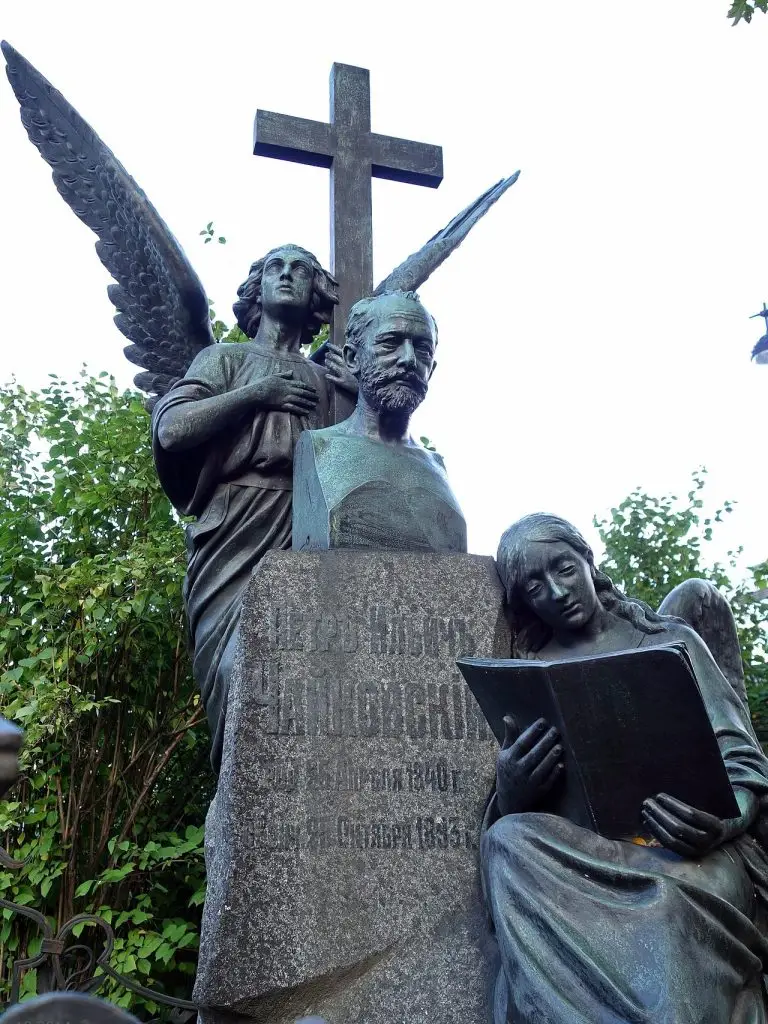
Tchaikovsky’s grave in Tikhvin Cemetery in Saint Petersburg (Wiki Image).
Musical Influence:
- Ballets: Tchaikovsky’s ballets, particularly “Swan Lake,” “The Nutcracker,” and “The Sleeping Beauty,” have become staples of the ballet repertoire. They revolutionized ballet music by integrating the score more closely with the choreography, creating a seamless and dramatic narrative.
- Symphonies: His symphonies, especially the Fourth, Fifth, and Sixth (“Pathétique”), are celebrated for their emotional depth, structural innovation, and orchestral color. They influenced later composers in both Russia and the West.
- Concertos: Tchaikovsky’s Piano Concerto No. 1 and Violin Concerto are among the most popular and frequently performed concertos. Their technical demands and expressive power set new standards for solo performance.
- Operas: His operas, such as “Eugene Onegin” and “The Queen of Spades,” are renowned for their lyrical beauty and dramatic intensity, influencing Russian opera and beyond.
- Orchestration: Tchaikovsky’s skillful orchestration, with its rich textures and innovative use of instruments, influenced subsequent generations of composers, including Rachmaninoff and Stravinsky.
Cultural Impact:
- Global Popularity: Tchaikovsky’s music transcends cultural and geographical boundaries. His works are performed worldwide, making him a global cultural icon.
- Holiday Traditions: “The Nutcracker” has become a beloved holiday tradition, especially in Western countries, where performances of the ballet are a staple of the Christmas season.
- Education: His music is a fundamental part of the classical music curriculum in conservatories and music schools, inspiring countless young musicians and composers.
- Cinematic Influence: Tchaikovsky’s music has been widely used in films, enhancing the emotional impact of many cinematic works. His compositions are instantly recognizable and often evoke a sense of drama and romance.
Institutions and Honors:
- Tchaikovsky Conservatory: The Moscow Conservatory, one of the most prestigious music schools in the world, is officially named the Moscow State Tchaikovsky Conservatory in his honor. It has produced many world-class musicians and continues to uphold his legacy.
- Tchaikovsky Competition: The International Tchaikovsky Competition, established in 1958, is one of the most prestigious music competitions in the world. It has helped launch the careers of numerous notable musicians.
- Museums and Monuments: Various museums and monuments dedicated to Tchaikovsky exist, including his birthplace museum in Votkinsk, the Tchaikovsky House-Museum in Klin, and numerous statues around the world.
- Honorary Titles: Tchaikovsky received numerous honors during his lifetime, including a lifetime pension from Tsar Alexander III in recognition of his contributions to Russian music.
- National Pride: In Russia, Tchaikovsky is celebrated as a national treasure. His music plays a central role in Russian cultural identity and heritage.
Tchaikovsky’s influence on music and culture is profound and enduring. His works continue to be celebrated for their emotional depth, technical brilliance, and universal appeal, ensuring his place as one of the greatest composers in history.
Tchaikovsky Music
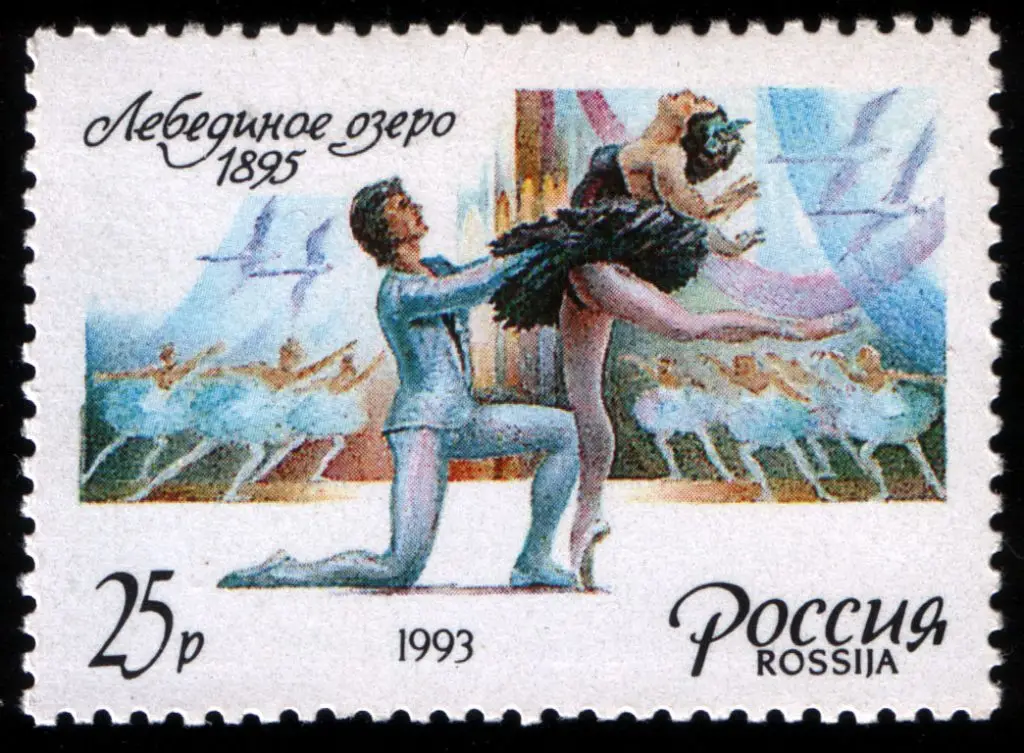
Swan Lake, a 1993 stamp of Russia (Wiki Image).
Ballets:
“Swan Lake” (1876)
Tchaikovsky: Swan Lake – The Kirov Ballet
(YouTube video)
“The Sleeping Beauty” (1890)
Tchaikovsky, Waltz from Sleeping Beauty
(YouTube video)
“The Nutcracker” (1892)
Tchaikovsky: The Nutcracker – Rotterdams Philharmonisch …
(YouTube video)
Symphonies:
Symphony No. 4 (1877–78)
Tchaikovsky Symphony Nº 4 OP 36 Herbert Von Karajan WPO
(YouTube video)
Symphony No. 5 (1888)
Tchaikovsky – Symphony No. 5 – Semyon Bychkov …
(YouTube video)
Symphony No. 6 (“Pathétique,” 1893)
Tchaikovsky: Symphony No. 6, ‘Pathétique’
(YouTube video)
Concertos:
Piano Concerto No. 1 in B-flat minor (1875)
Tchaikovsky: Piano Concerto No. 1 | Martha Argerich, Charles …
(YouTube video)
Violin Concerto in D major (1878)
Tchaikovsky Violin Concerto in D major, Op 35 Itzhak Perlman
(YouTube video)
Operas:
“Eugene Onegin” (1879)
“Eugene Onegin“ – Opera by Pyotr Ilyich Tchaikovsky
(YouTube video)
“The Queen of Spades”
The Queen of Spades – Pyotr Tchaikovsky
(YouTube video)
Other Works:
1812 Overture
Tchaikovsky – 1812 OVERTURE (full with Cannons, Fireworks …
(YouTube video)
Romeo and Juliet (Overture-Fantasy)
Tchaikovsky – Romeo and Juliet (Fantasy Overture)
(YouTube video)
Similarities and Differences Between Mozart, Beethoven, and Tchaikovsky
Similarities:
- Prodigious Talent: All three composers displayed exceptional musical talent from a young age, receiving extensive training and quickly gaining recognition for their abilities.
- Impact on Music History: Mozart, Beethoven, and Tchaikovsky are considered giants of Western music. Their compositions had a profound and lasting impact on the development of musical styles and forms.
- Diverse Repertoire: Each composer produced a wide range of works, including symphonies, concertos, chamber music, and operas (for Mozart and Tchaikovsky), demonstrating their versatility and mastery of different genres.
- Emotional Depth: Their music is characterized by emotional depth and expressive power, resonating with audiences across generations and cultures.
- Enduring Popularity: Their compositions continue to be performed and enjoyed worldwide, maintaining their relevance and appeal in the modern era.
Differences:
- Historical Context:
- Mozart (1756-1791): Lived and worked during the Classical era, characterized by balanced forms, clear melodies, and restrained emotional expression.
- Beethoven (1770-1827): Bridged the Classical and Romantic eras, transitioning from the structured forms of the Classical period to the more emotionally expressive and dramatic style of the Romantic era.
- Tchaikovsky (1840-1893): Represented the Romantic era, known for its emphasis on individuality, emotional intensity, and nationalism.
- Musical Style:
- Mozart: His music is characterized by its elegance, clarity, and balanced structure. He was a master of melody and form, creating music that is both intellectually stimulating and emotionally engaging.
- Beethoven: His music is known for its emotional depth, dramatic power, and innovative form use. He expanded the possibilities of the symphony and other genres, paving the way for the Romantic era.
- Tchaikovsky: His music is highly melodic and emotionally charged and often incorporates elements of Russian folk music. He is particularly celebrated for his ballets and orchestral works.
- Personal Lives:
- Mozart: Despite his musical success, Mozart faced financial difficulties and struggled to find stable patronage throughout his life. His early death at the age of 35 remains a mystery.
- Beethoven: Beethoven’s life was marked by personal struggles, including his gradual hearing loss, eventually leading to complete deafness. He was also known for his volatile temperament and difficult relationships.
- Tchaikovsky: Tchaikovsky’s personal life was also tumultuous, marked by struggles with his sexuality and depression. However, he found solace and fulfillment in his music, often expressing his emotional struggles.
- Influence:
- Mozart: His influence is evident in the works of many later composers, particularly in the development of opera and the concerto.
- Beethoven: His innovative approach to form and emphasis on emotional expression laid the groundwork for the Romantic era and inspired generations of composers.
- Tchaikovsky: He helped popularize Russian music on the international stage and established ballet as a major art form.
Despite their differences, Mozart, Beethoven, and Tchaikovsky are united by their extraordinary musical talent, enduring contributions to Western music, and ability to evoke a wide range of emotions in listeners across cultures and generations.
Comparing Mozart, Beethoven, and Tchaikovsky: Masters of Classical Music
| Aspect | Wolfgang Amadeus Mozart | Ludwig van Beethoven | Pyotr Ilyich Tchaikovsky |
| Birth and Death | 1756-1791 | 1770-1827 | 1840-1893 |
| Nationality | Austrian | German | Russian |
| Era | Classical | Transitional between Classical and Romantic | Romantic |
| Key Works | – Eine kleine Nachtmusik<br>- Requiem<br>- The Magic Flute | – Symphony No. 9 “Choral”<br>- Fidelio<br>- Moonlight Sonata | – Swan Lake<br>- The Nutcracker<br>- Symphony No. 6 “Pathétique” |
| Influence | Major figures in Classical music set the standard for symphonic, operatic, and chamber music | Bridged the Classical and Romantic eras, expanded the symphonic and sonata forms | He was a key figure in Romantic music, known for his ballets, symphonies, and operas |
| Compositional Style | Clear, balanced, elegant, and structured | Dramatic, emotional, innovative in form and harmony | Lush, emotional, and expressive with rich orchestration |
| Personal Challenges | Financial difficulties, strained relationships with patrons | Deafness, difficult personal life, strained relationships | Depression struggles with sexuality and personal crises |
| Legacy | Influenced countless composers, and the enduring popularity of his operas and symphonies | Pivotal in the transition to Romanticism, he was celebrated for his innovative compositions | Widely loved for his emotionally powerful music, his ballets are especially popular |
| Cultural Impact | Regarded as a musical prodigy and genius, his work remains a staple in classical music repertoire | Seen as a symbol of artistic triumph over adversity, his music is celebrated for its depth | His ballets are cultural icons, and his music is deeply connected to Russian identity and Western appreciation |
| Notable Anecdotes | Composed over 600 works in his short life. He began composing at the age of five | Continued to compose masterpieces even after becoming completely deaf | The Nutcracker and Swan Lake are among the most-performed ballets worldwide |
Summary
These three composers, each a giant in their respective eras, have left an enduring legacy on classical music. Their works continue to be performed and cherished worldwide, showcasing their unique styles and profound influence on the development of Western music.
Mozart, Beethoven, and Tchaikovsky are alive today!
Imagining Wolfgang Amadeus Mozart, Ludwig van Beethoven, and Pyotr Ilyich Tchaikovsky alive today is fascinating. Here’s a speculative look at how they might interact with the modern world and continue their musical legacies:
Wolfgang Amadeus Mozart
Adapting to Modern Times:
- Technology and Media: Mozart would likely be quick to embrace new technologies. His affinity for innovation might lead him to experiment with digital music production, virtual reality concerts, and composing for video games and films.
- Performance and Collaboration: Known for his prolific output and adaptability, Mozart collaborated with various artists across genres, from classical to pop to electronic music.
Major Contributions:
- Operas and Musicals: After continuing his love for drama and theater, Mozart might write operas and musicals combining classical and contemporary elements.
- Educational Outreach: His charismatic personality would make him a popular figure in music education. He could possibly lead masterclasses, offer online tutorials, and engage in social media outreach.
Ludwig van Beethoven
Adapting to Modern Times:
- Personal Struggles and Advocacy: Given his struggles with deafness, Beethoven might be an advocate for disability rights and accessibility in the arts. Modern hearing aids and cochlear implants could improve his hearing, influencing his compositions.
- Expanded Forms: Beethoven’s love for pushing boundaries might have led him to explore extended symphonic forms, integrate multimedia elements, and experiment with avant-garde techniques.
Major Contributions:
- Symphonic Works: Beethoven would likely continue to compose grand symphonies, incorporating electronic instruments and modern technology.
- Film Scores: His dramatic sensibility might have led him to compose influential film scores, becoming a significant figure in cinematic music.
Pyotr Ilyich Tchaikovsky
Adapting to Modern Times:
- Cultural Blending: Tchaikovsky’s ability to blend Western and Russian traditions might lead him to explore global musical influences and incorporate elements from various cultures into his work.
- Ballet and Stage Productions: He would likely continue to dominate the ballet world, creating new works and collaborating with choreographers to innovate the genre.
Major Contributions:
- Cross-Genre Works: Tchaikovsky composed music for contemporary dance, theater, and film, blending his expressive style with modern storytelling techniques.
- Music for Media: Given his knack for evocative melodies, Tchaikovsky might score for video games, television, and online media, reaching a broad audience.
Collaborative Projects and Influence
Modern Music Scene:
- Festivals and Concerts: The three composers might headline major music festivals, combining their classical roots with modern genres. Imagine a collaboration where Mozart’s playful melodies, Beethoven’s powerful harmonies, and Tchaikovsky’s emotional depth converge.
- Educational Initiatives: They could establish a global music academy, leveraging online platforms to teach and inspire the next generation of musicians.
Social Media Presence:
- Mozart: Likely the most active on social media, Mozart could entertain with behind-the-scenes looks at his creative process, humorous posts, and interactive Q&A sessions.
- Beethoven: His posts might focus on his advocacy work, personal reflections, and previews of his latest compositions.
- Tchaikovsky: Known for his introspective nature, Tchaikovsky might share insights into his emotional and creative journey and beautiful recordings of his works.
Imagining Their Music Today
Recordings and Performances:
- Mozart: Recording and performing with leading orchestras and popular musicians, releasing albums that mix classical and modern styles.
- Beethoven: Producing symphonies and concertos incorporating new technologies and soundscapes, possibly leading a groundbreaking ensemble.
- Tchaikovsky: Created lush, cinematic music for ballets and films, working with top directors and choreographers to bring his visions to life.
Cultural Impact:
- Their presence in today’s world would undoubtedly push the boundaries of classical music, making it more accessible and appealing to a broader audience. Their works would continue to inspire and influence countless musicians, composers, and artists across the globe.
Imagining Mozart, Beethoven, and Tchaikovsky alive today offers a glimpse into how their timeless genius could thrive and evolve in the contemporary world, enriching our musical landscape with unparalleled creativity and innovation.



